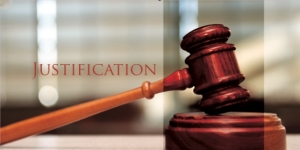True or False? Sanctification is when the sinner is declared righteous.
Some who took my Soteriology class that I taught at our Church’s(Bethlehem Bible Church) New England Institute for Biblical Studies in 2011 got this question wrong on the initial quiz testing their knowledge. If you answered True, so did you. Justification is when the sinner is declared righteous.
Justification is…
- …the divine legal verdict in the courtroom of God…
- …that changes the believer’s status and standing before God…(Rom. 2:13; Rom. 4:2)
- …by declaring the believer not guilty of sin,…
- …therefore freeing him from God’s wrath and condemnation,…(Rom. 1:18; 8:1)
- …and by declaring the believer fully righteous,…
- …not because of a righteousness inherent to the believer,…
- …but because of a foreign, alien righteousness,…(Rom. 10:3; Phil. 3:9)
- …namely Christ’s perfect righteousness imputed to the believer’s account,…(Philemon 18; 2 Cor. 5:21)
- …on the grounds of His active obedience to the Father by keeping the Law during His incarnation…
- …whereby God now looks upon the believer just as righteous as Christ Himself…

- …and the believer is fully acceptable in the sight of God.
On Dec. 24, 2004, Larry King Live, “Who Was Jesus?”, pastor John MacArthur said,
“That perfect life which Christ lived is credited to the account of every person who puts their trust in Him. Here is the heart of the Christian Gospel. On the cross, Jesus dies, for my sin. In other words, God treats Him as if He lived my life. Turns right around, and by my faith in Christ, God treats me as if I lived His life. He credits his life to my account. That’s the doctrine of justification and the heart of Christianity.”
So what about sanctification. If justification is when the sinner is declared righteous, sanctification is when the sinner is made righteous. If justification is righteousness imputed, sanctification is righteousness imparted. Unlike justification, sanctification is a process that takes place throughout our Christian lives until glorification.
There are two errors to avoid with justification and sanctification. One is to confuse justification with sanctification. Roman Catholicism makes this exact error. As John MacArthur wrote in his book “Faith Works: The Gospel According to the Apostles”(p. 90-91)
“Roman Catholicism blends its doctrines of sanctification and justification. Catholic theology views justification as an infusion of grace that makes the sinner righteous. In Catholic theology, then, the ground of justification is something made good within the sinner – not the imputed righteousness of Christ. The Council of Trent, Rome’s response to the Reformation, pronounced anathema on anyone who says “that the
[sinner] is justified by faith alone – if this means that nothing else is required by way of cooperation in the acquisition of the grace of justification.””The other error to avoid is to say that there is no connection between justification and sanctification. The words of some well known Bible teachers who have gone before us testify to this.
“Christ justifies no man without also sanctifying him.”
John Calvin“The whole 6th chapter of Romans was written for no other purpose than to assert and demonstrate that justification and sanctification are indissolubly bound together; that we cannot have the one without having the other.”
B.B. Warfield“You cannot receive Christ as your justification only, and then, later, decide to refuse or to accept him as your sanctification.”
Martin-Lloyd Jones“If holiness does not start, we have the right to suspect that justification never started either.”
Donald Grey Barnhouse

